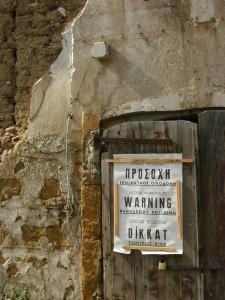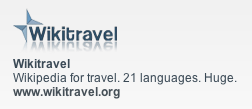This is a followup to Wikimedia confirms creation of travel wiki, sues Internet Brands to end legal threats against volunteers, so please read that first if you haven’t already.
 There’s been plenty of analysis of the Wikimedia Foundation’s countersuit against Internet Brands, but little of the original lawsuit by Internet Brands against its volunteers, mostly because it took a few days until a copy was published. Here’s a fast food themed attempt to fill that gap, with extra pickles and ketchup.
There’s been plenty of analysis of the Wikimedia Foundation’s countersuit against Internet Brands, but little of the original lawsuit by Internet Brands against its volunteers, mostly because it took a few days until a copy was published. Here’s a fast food themed attempt to fill that gap, with extra pickles and ketchup.
Disclaimer: I’m not a lawyer, and I don’t even play one on the Internet, so take what you’re about to read with a fistful of french fries. But if you can punch any holes in my amateur logic, I’m all ears.
So. The four counts made by Internet Brands against Wikitravel users Ryan “Wrh2” Holliday and James “Jmh649” Heilman are:
- Common Law Trademark Infringement
- Federal Unfair Competition, False Designation of Origin and Trade Name Infringement (aka Lanham Act)
- Unfair competition
- Civil conspiracy
And the single most curious statement in a very curious lawsuit is:
49. Defendants are offering Administrators, contributors and other users a competitive website by trading on Internet Brands’ Wikitravel Trademark.
Well, no, they aren’t: there is no competing website yet. In other words, Internet Brands is not suing because somebody is actually competing against them with some falsely labeled product, but merely because they think they will. To put that in perspective, imagine McDonald’s having an effective monopoly on selling hamburgers in a town, and then Burger King announces that they’re considering opening an outlet that will also sell hamburgers. How far would a lawsuit against them made on that basis alone fly?
 It gets even sillier: the lawsuit is not even against the putative future competing entity (Wikimedia), but against two volunteers of the existing site, who are not employees of either. To continue our burgerrific analogy, imagine two customers of McDonald’s publicly announcing that they’d eat hamburgers at Burger King if one opened up, and then getting sued for it. Seriously?
It gets even sillier: the lawsuit is not even against the putative future competing entity (Wikimedia), but against two volunteers of the existing site, who are not employees of either. To continue our burgerrific analogy, imagine two customers of McDonald’s publicly announcing that they’d eat hamburgers at Burger King if one opened up, and then getting sued for it. Seriously?
What’s more, since Holliday and Heilman are both unpaid volunteers, the applicability of any of the charges is seriously questionable. For example, Lanham Act Section 43(a) requires that the trademark be used “in commerce“, but what commerce has taken place? For unfair competition, Internet Brands alleges that they “have engaged, and continue to engage, in wrongful business conduct“, but what business are they talking about? And while every charge ends in the boilerplate claim that “Defendants have been unjustly enriched“, I entirely fail to see how Holliday and Heilman have been “enriched” in any way. Quite the contrary, it’s the work of unpaid volunteers like them that has been enriching Internet Brands in the past five years.
But those three arguments actually unnecessarily dignify the charges, since you could come away with the misleading impression that they would have some merit once the competing website is up and running. IB’s argument against Heilman seems to hinge on this claim:
22. Heilman announced that the “new” site, which would combine the Wikitravel Website through a straw-man transaction with Wikivoyage.org (the “Wikivoyage Website”) into a Wikimedia Foundation website that would be called “Wiki Travel Guide” (the “Infringing Website”).
Nope. As clearly stated in the proposal, the final name of the site remains undecided, although it seems likely to launch as travel.wikimedia.org. The working name “Wiki Travel Guide” (as in, a travel guide that’s a wiki) was used for a few days, but it was dropped on April 24 in favor of the generic “Travel Guide”, four months before the end of the discussion period on August 23.
Also, given that Wikivoyage e.V. has been an independent German registered association since 2006, characterizing it as a “straw-man” for Heilman and Holliday seems both ludicrous and potentially defamatory.
Holliday’s original sin, on the other hand, was allegedly this:
30. Specifically, Holliday’s email contained the Subject Line, “Important information about Wikitravel” and its body stated, “This email is being sent to you on behalf of the Wikitravel administrators since you have put some real time and effort into working on Wikitravel. We wanted to make sure that you are up to date and in the loop regardling big changes in the community that will affect the future of your work! As you may already have heard, Wikitravel’s community is looking to migrate to the Wikimedia Foundation.”
31. Holliday and Heilman clearly intended to confuse Wikitravel Website participants into thinking the Wikitravel Website is migrating to Wikimedia, in order to gain, through improper and illegal means, all the traffic and content creators currently contributing to Wikitravel.
Or in short, on Planet IB, the terms “Wikitravel”, “Wikitravel administrators” and “Wikitravel’s community” are all to be interpreted to be referring to web host Internet Brands alone, as opposed to the users and the content that make up the site. This is nonsensical, especially given that the users “intended to [be] confused” were exclusively those long-term, prolific Wikitravel contributors most familiar with the site. Internet Brands themselves is well aware of the distinction (see eg. this comment where they distinguish admins and community, and this for host vs community), but burgerizing it makes it even clearer:
This email is being sent to you on behalf of the McDonald’s fan club since you have put some real time and effort into eating at McDonald’s. We wanted to make sure that you are up to date and in the loop regarding big changes in the fan community that will affect the future of your meals! As you may already have heard, McDonald’s diners are looking to go eat at Burger King.
Would you read that as saying that the McDonald’s Corporation is is moving over to Burger King? I don’t think so.
And there’s more:
 At the same time that they’re suing for trademark infringement, Internet Brands themselves continues to describe Wikitravel as “Wikipedia for travel.” Needless to say, Wikipedia is a trademark of the Wikimedia Foundation. Oops!
At the same time that they’re suing for trademark infringement, Internet Brands themselves continues to describe Wikitravel as “Wikipedia for travel.” Needless to say, Wikipedia is a trademark of the Wikimedia Foundation. Oops!- The last action attributed to the defendants occurred on August 18, 2012, but Internet Brands only applied to register “Wikitravel” as a trademark on August 22, 2012. (Deep links to the USPTO aren’t allowed, but try a trademark search on TESS.) Now, unregistered trademarks can still be trademarks, but it’s still interesting that IB apparently didn’t care about it until this year!
Internet Brands’ final claim is that there is the “civil conspiracy” against them and that the defendants have engaged in all sorts of dastardly “unlawful acts”. In particular:
32. Holliday not only violated trademark laws, he violated the administrative access given to him by Internet Brands by improperly using personal information stored on Internet Brands’ servers about users and writing to them by name, in an attempt to bolster the appearance of a direct communication from the owners of the Wikitravel Website.
Where to begin? First, Internet Brands did not “give” Holliday administrator access; he has been an administrator since June 2005, before Internet Brands bought the site. Second, administrative access is not necessary to mail users, as anybody who is logged in can do it: here’s a form for sending mail to everybody’s favorite Internet Brands apologist, Paul “IBobi” O’Brien. (Be nice, mmkay?) And third, “bolster the appearance” and “writing to them by name” are just nonsensical, since MediaWiki form e-mails clearly show the name of the sender and does not expose any of the receiver’s personal information.
Last and least, my favorite claim of all:
26. On July 12, 2012, Heilman met at the Wikimania convention with a number of Administrators and others to reach a further meeting of the minds as to the unlawful acts to be undertaken.
Guess who else was in on this conspiratorial “meeting of the minds”? Chuck Hoover, CMO of Internet Brands, who was even courteous enough to announce his visit publicly!
And there is one interesting thing that Internet Brands is not doing: at no point do they dispute the validity of the Creative Commons license, which indicates that even their legal team thinks they have no chance of stopping the content itself from being forked. They are clutching desperately at straws to try to get the community to stop leaving, but the lawsuit has more holes than a chip frying basket, and is likely to get crumpled up and thrown away like a used burger wrapper as soon as a judge sees it.
Final disclaimer: McDonald’s is a trademark of McDonalds Corp. Burger King is a trademark of Burger King Inc. Any references to either in this post are illustrative works of fiction.

 The end goal is thus that the content and communities from both Wikitravel and Wikivoyage will become Wikimedia Travel, strong and vibrant under a host that shares the ethos and has the technical capability and other resources to maintain it. As an inevitable side effect, Wikitravel the site will die a slow and lingering death.
The end goal is thus that the content and communities from both Wikitravel and Wikivoyage will become Wikimedia Travel, strong and vibrant under a host that shares the ethos and has the technical capability and other resources to maintain it. As an inevitable side effect, Wikitravel the site will die a slow and lingering death.